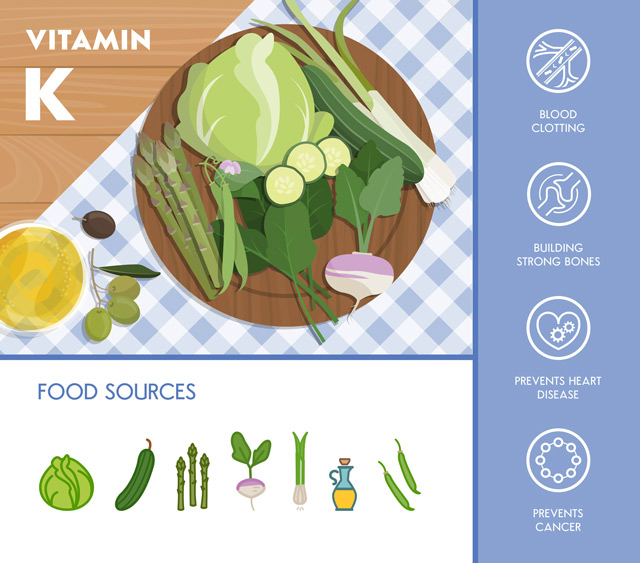Overview of Health Conditions Vitamin K May Help

Scientists used to think the only known function of vitamin K was its critical role in blood clotting. However, newer studies suggest vitamin K impacts other protein activities as well. These effects could be beneficial in preventing or treating various diseases and conditions.(1, 7, 9-10, 22-25)
These include:
- Acute pancreatitis(26)
- Alpha-1-antitrypsin deficiency(19)
- Aging nervous system(4)
- Alzheimer's disease(27-28)
- ALS (Lou Gehrig's disease)(27-28)
- Anticoagulation therapy with warfarin(29)
- Arthritis(30)
- Atherosclerosis(31)
- Bone fractures(11)
- Bruising(32)
- Desmoid tumors(33)
- Diabetes(34)
- Dysmenorrhea(35-36)
- Heart disease(31)
- Infections, including multidrug resistant Staphylococcus aureus and E. coli infections(4, 7, 9-10, 37)
- Kidney transplants(38)
- Liver cancer(39-40)
- Lung cancer(41)
- Non-hodgkin lymphoma(42)
- Osteoporosis(11)
- Pancreatic cancer(43)
- Parkinson's disease(27-28)
- Prostate cancer(44)
- Side effects of cancer and multiple sclerosis treatment(45-46)
- Unhealthy cholesterol levels(31)
- Wrinkles(47)
In fact, some studies suggest that increased vitamin K intake is linked to reduced overall mortality. Results of a clinical trial involving people showed those who ingested more vitamin K had lower risk of death from heart disease, cancer, or any other cause. Study participants were chosen from a population with a high risk of heart disease.(48)
Vitamin K2.(31)
In older men.(34)
Vitamin K2.(31)
Vitamin K3 may improve antibiotic effectiveness.(37)
Vitamin K2.(31)
Disclaimer: This website is not intended to replace professional consultation, diagnosis, or treatment by a licensed physician. If you require any medical related advice, contact your physician promptly. Information presented on this website is exclusively of a general reference nature. Do not disregard medical advice or delay treatment as a result of accessing information at this site.


